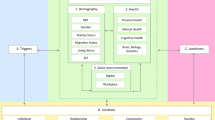Abstract
A structural equations model is proposed to identify direct, indirect, and total effects of selected predictors of psychological distress in a national-area probability sample of Mexican American, Puerto Rican and Cuban elderly. Multivariate regression procedures vis-\,a-vis LISREL-7 techniques are used. The findings indicate that the modified path model explains 29% of the variance in psychological distress. Measures of acculturation have significant indirect effects on psychological distress via other intervening variables in the model. All selected measures of health and stress included in the model have significant direct effect on psychological distress. Implications of the findings for future research and public policy are discussed. jg]Key words gw]Acculturation gw]Health gw]Psychological distress gw]Stress gw]Elderly Hispanics gw]USA
Similar content being viewed by others
References
Andrews J. (1989). Poverty and poor health among elderly Hispanic Americans. Baltimore, MD: The Commonwealth Fund Commission on Elderly People Living Alone.
Angel J.L. & Angel R.J. (1992). Age at migration social connections, and well-being among elderly Hispanics, Journal of Aging and Health 4: 480–495.
Bradburn M.N. (1969). The structure of psychological well-being. Chicago: Aldine.
Burnam M.A., Hough R.L., Escobar J.I., Karno M., Timbers D.M., Telles C.A. & Locke B.Z. (1987). Acculturation and life time prevalence of psychiatric disorders among Mexican Americans in Los Angeles, Journal of Health and Social Behavior 28: 89–102.
Carmines E.G. & Zeller R.A. (1979). Reliability and validity assessment. Beverly Hills, CA: Sage Publications.
Cohen R.E. (1987). Stressors: Migrations and acculturation to American society. In S. Bolvar (ed.), Health and behavior research agenda for Hispanics (pp. 59–71). Chicago: The University of Illinois at Chicago.
Derogatis L.R. & Melisaratos N. (1983). The brief symptom inventory: An introductory report, Psychological Medicine 13: 595–605.
Hayes D. & Ross C.E. (1986). Body and mind: The effect of exercise, overweight, and physical health on psychological well-being, Journal of Health and Social Behavior 27: 387–400.
Hazuda H.P. & Haffner S.M. (1984). Acculturation as a protective factor against diabetes in Mexican Americans: The San Antonia Heart Study, Diabetes 33: 30A.
Joreskog K.G. & Sorbom D. (1988). Liseral 7: A guide to the program and applications. Chicago: SPSS, Inc.
Krause N. & Baker E. (1992). Financial strain, economic values, and somatic symptoms in later life, Psychology and Aging 7: 4–14.
Maldonado D. (1990). The Hispanic elderly: Vulnerability in old age. In American Association of Retired Persons: Minority Affairs Institute, pp. 165–176.
Markides K.S. (1989). Aging and health. Newbury Park: Sage Publications.
Markides K.S. & Lee D.J. (1991). Predictors of health status in middle-aged and older Mexican Americans, Journal of Gerontology 46: S243-S249.
Marks G., Garcia M. & Solis J.M. (1990). Health risk behaviors of Hispanics in the United States: Findings from HANES, 1982–84, American Journal of Public Health 80: 20–26.
Moscicki E.J., Locke B.S., Rae D.S. & Boyd J.H. (1989). Depressive symptoms among Mexican Americans: The Hispanic health and nutrition examination survey, American Journal of Epidemiology 130: 348–360.
Narrow W.E., Rae D.S., Moscicki E.K., Locje B.Z. & Reiger D.A. (1990). Depression among Cuban Americans: The Hispanic health and nutrition examination survey, Social Psychiatry and Psychiatric Epidemiology 25: 260–268.
Radloff L.S. (1977). The CES-D scale: A self report depression scale for research in the general population, Applied Psychological Measurement 1: 385–401.
Siddharthan K. & Sowers-Hoag K. (1989). Elders' attitudes and access to health care: A comparison of Cuban immigrants and native-born Americans, The Journal of Applied Gerontology 8: 86–96.
Torres-Gill F. (1990). Aging in Hispanic America. In American Association of Retired Persons: Minority Affairs Institute, pp. 147–163.
Thoits, P. (1983). Dimensions of life events that influence psychological distress: An evaluation and synthesis of the literature. In H. Kaplan (ed.), Psychosocial stress: Trends in theory and research (pp. 33–103). San Diego, CA: Academic Press.
US Bureau of the Census (1986). Current Population Series, No. 15 (p. 60). Washington, DC: US Government Printing Office.
Author information
Authors and Affiliations
Rights and permissions
About this article
Cite this article
Tran, T.V., Fitzpatrick, T., Berg, W.R. et al. Acculturation, health, stress, and psychological distress among elderly Hispanics. J Cross-Cultural Gerontol 11, 149–165 (1996). https://doi.org/10.1007/BF00114858
Issue Date:
DOI: https://doi.org/10.1007/BF00114858




